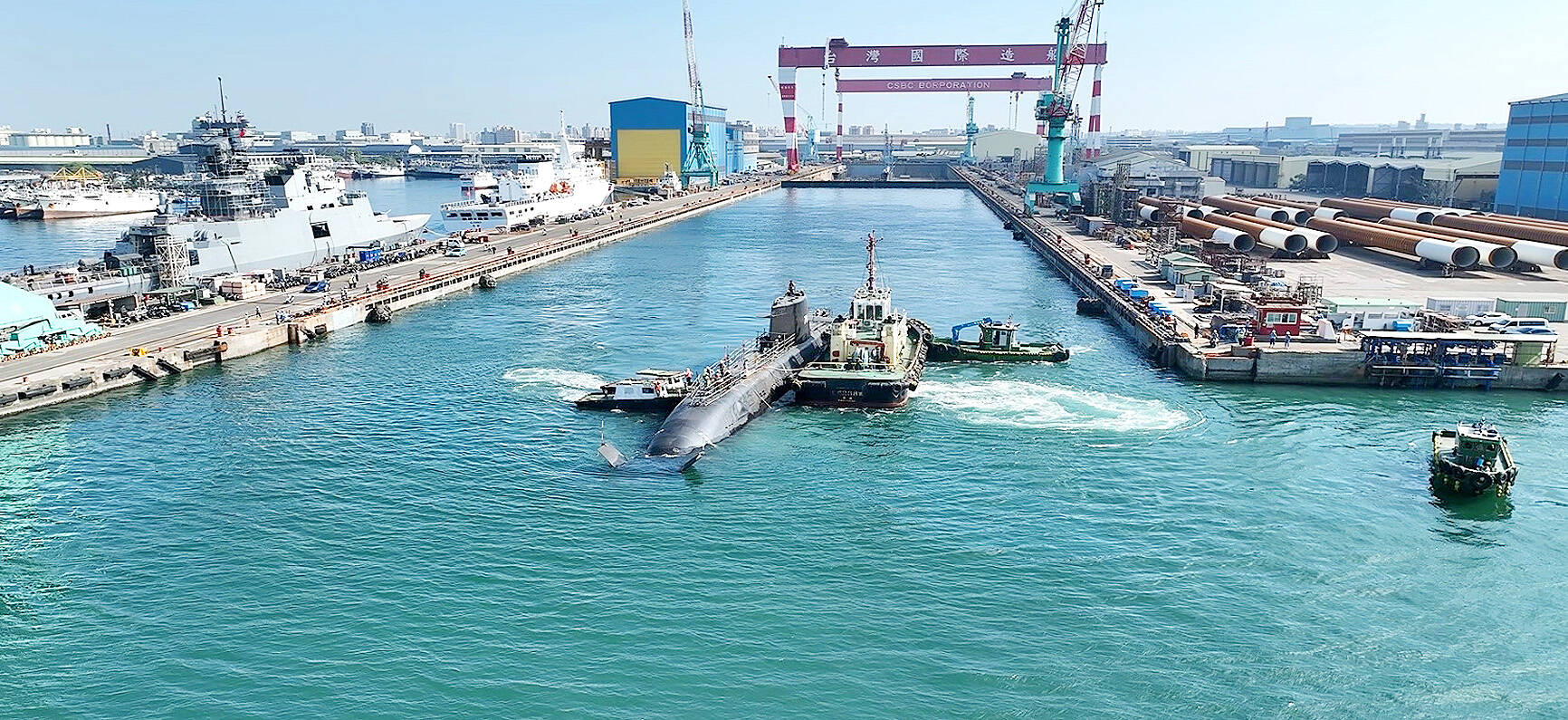The prototype of the Hai Kun-class indigenous defense submarine was moved from a dry dock to another dock in Kaohsiung yesterday to facilitate more testing.
A photograph of the vessel being towed was posted on Facebook by hobbyist group Vessel Story (船舶物語) hours before CSBC confirmed it in a news release.
The Hai Kun-class submarine was moved to Dock No. 91 of the Port of Kaohsiung to facilitate tuning its diesel-electric power plant and conduct a harbor acceptance trial following the completion of pre-submergence and incline tests, the shipbuilder said.

Photo courtesy of CSBC
CSBC has confidence that the vessel would comply with all safety standards, performance requirements and project timetables, including its planned sea trial in April, the company said.
The Hai Kun program of attack submarines has become symbolic of Taiwan’s efforts to build asymmetric capabilities to counter China’s superior numbers and firepower should the two come to blows.
Last month, lawmakers from the Chinese Nationalist Party (KMT) and the Taiwan People’s Party froze half of the annual funding for work on the planned submarine fleet as part of massive cuts to the central government’s general budget.
The Ministry of National Defense’s ability to access the suspended funds is contingent on the timely completion of the prototype’s sea-acceptance trial, putting the testing under intense scrutiny.
Unstable voltage in the vessel’s electrical systems had burned out components at an unsustainable rate, Chinese-language online news provider Up Media reported on Sunday, citing an anonymous source.
The need to replenish spare parts is likely to push back the delivery date, it said.
Democratic Progressive Party Legislator Chen Kuan-ting (陳冠廷) — who is a member of the Foreign Affairs and National Defense Committee — disputed the report, saying that replacing or changing specifications of components is routine in the testing phase.
The navy considers the performance of the submarine to be up to specifications and nothing important had gone amiss with its construction, Chen said, citing conversations with senior navy officers.
The allegations regarding parts being burned out by unstable voltage were incorrect, as the submarine had ready access to shore-based, voltage-regulated power sources if onboard systems proved unreliable, he said.
The navy fully expects to initiate sea trials on time, Chen said, adding that the public should support the ministry’s program to manufacture submarines domestically.

Taiwan is stepping up plans to create self-sufficient supply chains for combat drones and increase foreign orders from the US to counter China’s numerical superiority, a defense official said on Saturday. Commenting on condition of anonymity, the official said the nation’s armed forces are in agreement with US Admiral Samuel Paparo’s assessment that Taiwan’s military must be prepared to turn the nation’s waters into a “hellscape” for the Chinese People’s Liberation Army (PLA). Paparo, the commander of the US Indo-Pacific Command, reiterated the concept during a Congressional hearing in Washington on Wednesday. He first coined the term in a security conference last

Prosecutors today declined to say who was questioned regarding alleged forgery on petitions to recall Democratic Progressive Party (DPP) legislators, after Chinese-language media earlier reported that members of the Chinese Nationalist Party (KMT) Youth League were brought in for questioning. The Ministry of Justice Investigation Bureau confirmed that two people had been questioned, but did not disclose any further information about the ongoing investigation. KMT Youth League members Lee Hsiao-liang (李孝亮) and Liu Szu-yin (劉思吟) — who are leading the effort to recall DPP caucus chief executive Rosalia Wu (吳思瑤) and Legislator Wu Pei-yi (吳沛憶) — both posted on Facebook saying: “I

The Ministry of Economic Affairs has fined Taobao NT$1.2 million (US$36,912) for advertisements that exceed its approved business scope, requiring the Chinese e-commerce platform to make corrections in the first half of this year or its license may be revoked. Lawmakers have called for stricter enforcement of Chinese e-commerce platforms and measures to prevent China from laundering its goods through Taiwan in response to US President Donald Trump’s heavy tariffs on China. The Legislative Yuan’s Finance Committee met today to discuss policies to prevent China from dumping goods in Taiwan, inviting government agencies to report. Democratic Progressive Party Legislator Kuo Kuo-wen (郭國文) said

The Ministry of Economic Affairs has fined Taobao NT$1.2 million (US$36,900) for advertisements that exceeded its approved business scope and ordered the Chinese e-commerce platform to make corrections in the first half of this year or its license would be revoked. Lawmakers have called for stricter supervision of Chinese e-commerce platforms and more stringent measures to prevent China from laundering its goods through Taiwan as US President Donald Trump’s administration cracks down on origin laundering. The legislature’s Finance Committee yesterday met to discuss policies to prevent China from dumping goods in Taiwan, inviting government agencies to report on the matter. Democratic Progressive Party